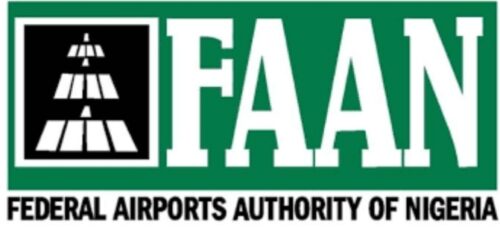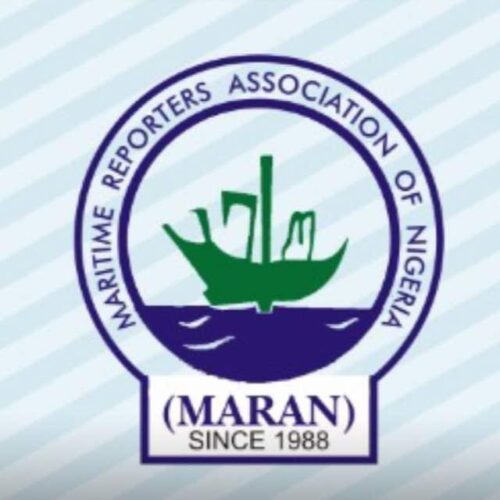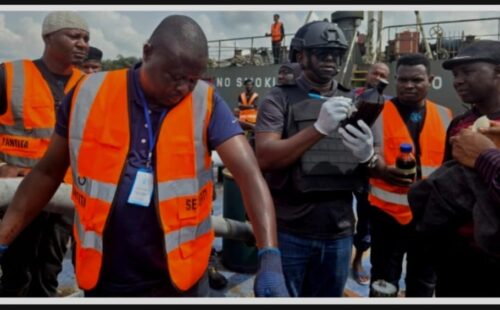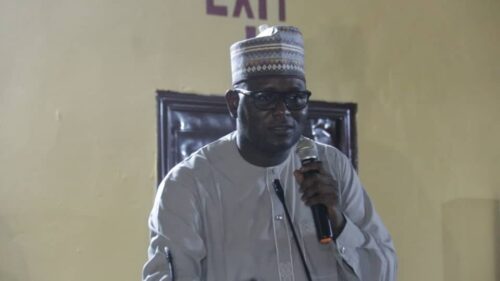Expert Canvass Low cost Strategies to Curb Drug, Human Trafficking
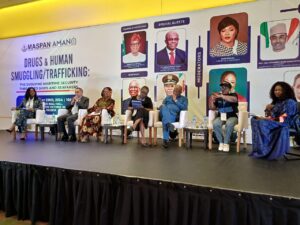
An expert in the Maritime sector, Mr Suresh Prabhakar, has called for low cost practical approach to tackling the challenge of drug trafficking without causing huge capital losses to ship owners.
He lamented that several shipowners have been made to go bankrupt due to the huge cost incurred by way of vessel delays, legal costs, crew salaries, family upkeep and the likes in an attempt to rid their vessels of traffickers.
Prabhakar, Director, Operations, Pacific Basin Shipping Limited, Hong Kong, spoke at the Maritime Security Providers Association of Nigeria (MASPAN) and Alumni of Maritime Academy of Nigeria Oron (AMANO) Conference themed Drugs & Human Smuggling/Trafficking: The Evolving Maritime Security Threats To Ships Seafarers” in Lagos, Thursday.
He bemoaned incidences where agencies like the Nigerian Drug Law Enforcement Agency (NDLEA) detains ship for long period of time, spends months on investigation, while crew were later found non complicit in trafficking humans, drugs and other related crimes.
He said: “From February 2021 to July 2024, there were 4 bulk carriers laden with Sugar from Santos, Brazil to Lagos where Cocaine of quantities varying from 18 to 43 kilograms were discovered on board each ship by the NDLEA.
“During the course of the investigations, each ship was delayed for between 4 to 6 months and allowed to sail after owners posted bonds ranging from US$ 2 ~ 5 million.
“On each ship about half the crew members, which is about 10 crew per ship were detained. The bail amount posted per crew member to allow them to reside in a hotel rather than in a detention facility was US$ 40,000, which totals to US$ 400,000 for 10 crew.
“On two ships, after multiple Court Hearings crew were released after being detained for about 20 months each. The other two ships’ crew are still under detention in Lagos whilst Court Hearings are ongoing. The crew have been in Lagos for 34 months and 13 months respectively.
“Such incidents cost ship owners huge amounts of money in lost revenue by way of vessel delays, legal costs, crew salaries, family upkeep and the like. Additionally, when crew members are subjected to such treatment, most responsible owners expend a lot of time and effort in trying to secure their release.
“Cases such as these adversely impact the ability of ship owners to engage in such trades and several owners and operators are forced to choose alternative trade routes.
“So that’s what we are trying to appeal against, that there should be uniformity across the world. NDLEA is doing the job, in all good faith they are doing the job well, they are following the laws.
“But all we say is that there has got to be a change in the manner in which they approach things, they should approach it in the same way the rest of the world is approaching it.
“If there is compelling evidence that there are certain crew members involved, do let us know, do let the ship owner know. Ship owners will cooperate and get that crew member off the ship.
“They will give them to the authorities to arrest and do whatever they want to do with them.
“But the rest of the crew, the ship should not be penalized. But in 99.99% of the cases there is zero crew members involved. It’s the cartels.
“But unfortunately in some countries like here, the NDLEA have been detaining ships for long periods of time, crews for long periods of time and then they have sort of been put through a lot of mental and physical stress. And then many of them don’t want to come back to sea again as a career” he disclosed.
In his address, the Minister Of Marine and Blue Economy, Gboyega Oyetola, who also doubles as the chairman of the event decried the troubling increase in Maritime threat, particularly those related to drugs and human trafficking.
Oyetola, who was represented by Director Marine Environment Management, NIMASA, Mr. Heaky Dimowo said: “These activities are not merely criminal act, they erode our social fabric, destabilize communities and challenge our law enforcement at sea.
“Moreover, they pose significant risk to the Maritime and Security of seafarer and vessels. Today we must confront the fact that our waters are increasingly viewed as transit route to illicit activities.
It is essential that we develop comprehensive strategies to address these evolving threats by leveraging technical innovations, enhancing our intelligence capabilities and fostering collaboration in among critical stakeholders Together, we can develop multifaceted responses that effectively combat these challenges.”
On his part, the President of MASPAN/AMANO, Mr Emmanuel Maiguwa, in his welcome address noted that records from the United Nations Office on Drug and Crime (UNODC) show West Africa is a transit region for narcotics mostly emanating from South America hence the need for an event as this.
“With recent incidents involving merchant ships (excluding cases of drugs concealed in cargo containers) from South America to Nigeria rising to about four (4) within the last two (2) years, this maritime corridor proves to be providing mobility for this illicit activity.
“On the issue of human trafficking, records from Africa Risk Compliance (ARC) show a significant number of incidents where stowaways have been discovered on ships calling Nigerian ports.”
Continuing, Maiguwa disclosed that while we may not present specific records linking stowaways to drug smuggling operations, it is of great concern that drug traffickers could potentially collaborate with stowaway networks. This partnership could lead to a coordinated effort to use stowaways as couriers, moving drugs from West Africa to Europe.
“Both MASPAN and AMANO express strong support for the fight against all forms of trafficking and smuggling, including Drugs and humans; we are mainly focused on addressing responses to these crimes as they occur within the maritime corridor.
“We aim to ensure that perpetrators of these crimes are apprehended and fully punished of the law without subjecting the innocent to unnecessary difficulties that are counterproductive to the growth of shipping,” he said.


